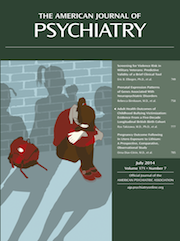If I were to catalog all of Jeffrey A. Lieberman’s accomplishments, we’d be here overnight, and Alan Alda would miss his moment on the APA stage—his best medical assignment since his tenure in a fictive Korea. But let me give a few highlights drawn from Dr. Lieberman’s 57-page CV.
Jeff Lieberman is of course President of the APA (for a few more days); he is the Lawrence C. Kolb Professor and Chairman of Psychiatry at the Columbia University College of Physicians and Surgeons; he is Director of the New York State Psychiatric Institute. He also holds the Lieber Chair and serves as the Psychiatrist-in-Chief of New York Presbyterian Hospital-Columbia University Medical Center.
He attended Miami University on a football scholarship and has served on the faculties of Mount Sinai, Albert Einstein, and the University of North Carolina. His research has focused on the neurobiology, pharmacology, and treatment of schizophrenia and related psychotic disorders. His work has advanced our understanding of the natural history and pathophysiology of schizophrenia and undergirds the early detection and intervention strategy for psychotic disorders. His focus on the pharmacology and clinical effectiveness of antipsychotic drugs has advanced the treatment of schizophrenia, spurring pharmacologic innovations in drug development. He served as principal investigator of the Clinical Antipsychotic Trials of Intervention Effectiveness (CATIE) Research Program, the largest study ever sponsored by the NIMH.
He is the author of more than 500 articles and has edited or coedited 10 academic books.
In the best tradition of translational research, his research applies new knowledge drawn from basic science. He is a passionate advocate for psychiatry as a discipline of medicine and a tireless champion of the rights of the mentally ill. Engaging in the politics of mental health as much as in the treatment of mental illness, he has emerged as a singularly effective public spokesperson for the field.
He is a member of the National Academy of Sciences Institute of Medicine, a fellow of the American Association for the Advancement of Science, and a recipient of the Lieber Prize for Schizophrenia Research from NARSAD, the Adolph Meyer Award from the American Psychiatric Association, the Stanley R. Dean Award for Schizophrenia Research from the American College of Psychiatry, and the National Alliance on Mental Illness Research Award, among others.
He has recently completed a book for general audiences titled Shrinks: The Untold Story of Psychiatry. It is a masterful behind-the-scenes examination of psychiatry and, by extension, the human condition. His epic narrative charts the unlikely ascent of “the stepchild of medicine” from the earliest parlor-room charlatans of animal magnetism to the contentious Digital Age roll-out of the DSM-5, paralleling his own professional transformation from eager psychoanalytic student of Freud to neuroscience-minded President of a reformed APA. It is a wise and gripping book that tackles one of the most important questions of our time: What is mental illness?
If you’ve been at previous events at which Jeff Lieberman has been introduced, you will have heard many of these commendations before. But I would like to add one more. In the “helping professions,” many professionals are only sporadically helpful; they are committed to their investigations and perhaps a few patients. But Jeff Lieberman is not only tireless on the front lines of research and policy but also truly dedicated to helping anyone who suffers psychiatric challenges. Because of my own work, I am asked several times a day for references to therapists in far-flung places, and there has never been a time when I’ve asked Jeff to help me locate someone when he hasn’t done so. He has guided many of my friends through the mental health system at New York Presbyterian-Columbia. When I set out to write about schizophrenia, Jeff not only gave me the basic information by which I came to understand the condition but also reviewed everything I wrote for scientific accuracy. Introductions are appropriately focused on accomplishments, and one of Jeff’s real accomplishments is his kindness, which illuminates the lives of all those who know or work with him. His career has never gotten in the way of his underlying character, and with a career as vast as his, that is not an easy balance to sustain.
I am honored to introduce a great author, a great physician scientist, and a great friend: Dr. Jeffrey A. Lieberman.

